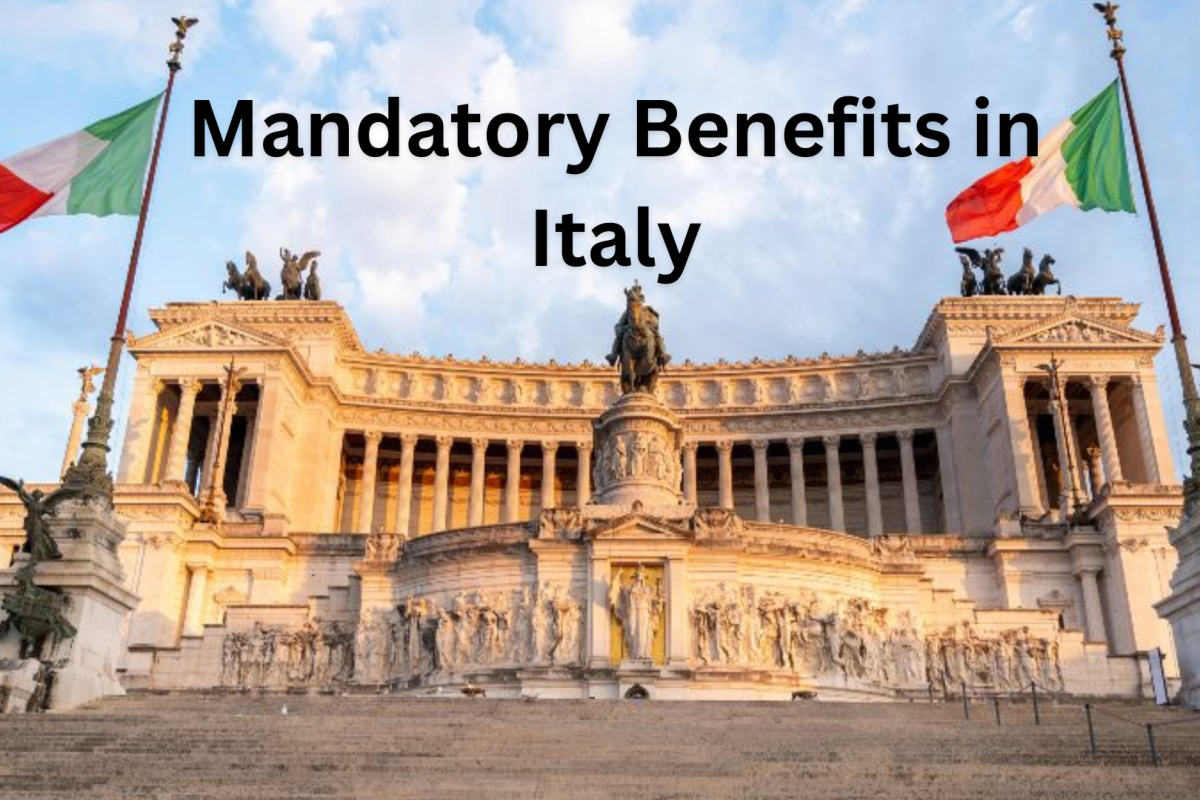Italy offers a robust framework of employee benefits to support financial stability, healthcare access, protection against workplace injuries, and paid leave for workers. These benefits, mandated by Italian labor laws, play a crucial role in ensuring employee welfare. Employers, whether working independently or through Employer of Record (EOR) or Professional Employer Organization (PEO) services, must strictly adhere to these regulations to remain compliant and foster a positive work environment.
1. Social Security (INPS – National Institute of Social Security)
- Description: The INPS covers pensions, healthcare, unemployment, and disability benefits. Both employers and employees contribute to the social security system.
- Employer Contribution: Typically 24.75% to 33% of an employee’s salary, based on sector and employee classification.
- Employee Contribution: Around 9% to 10% of the monthly wage.
- Outcome: The contributions ensure access to a range of social security benefits, including medical care, pension, unemployment, and disability insurance.
2. Healthcare Coverage
- Description: The Italian National Health Service (Servizio Sanitario Nazionale, or SSN) provides healthcare coverage to all residents, funded by both the government and employee contributions through INPS. This includes hospital visits, surgeries, medical treatments, and preventive care.
- Employer Contribution: Included as part of the social security contributions (INPS).
- Employee Contribution: Indirectly covered through social security contributions, with no additional payments required from employees for basic healthcare services.
- Outcome: Employees have access to a comprehensive healthcare system, including free or low-cost medical treatments, hospital care, and general healthcare services.
3. Paid Annual Leave
- Description: Employees are entitled to a minimum of four weeks (20 days) of paid annual leave, with additional leave potentially granted based on seniority or collective bargaining agreements.
- Length of Service:
- Less than 2 years: 20 days of paid leave.
- 2 to 5 years: 20 days of paid leave.
- More than 5 years: 20 days of paid leave.
- Outcome: Employers must ensure that employees take their full statutory leave, or they may be required to compensate employees for unused leave.
4. Maternity and Paternity Leave
- Description: Italy provides generous maternity and paternity leave benefits to ensure that employees can care for their newborn children.
- Maternity Leave: Female employees are entitled to five months (20 weeks) of paid maternity leave. The first two months are paid at full salary, while the remaining three months are paid at 80% of salary.
- Paternity Leave: Male employees are entitled to 1-2 days of paid paternity leave.
- Outcome: These leave benefits ensure financial security and job protection for parents during childbirth.
5. Sick Leave
- Description: Employees are entitled to paid sick leave, with the amount of pay depending on their length of service.
- Sick Leave Entitlement:
- Less than 3 years of service: 3 days of fully paid sick leave.
- More than 3 years of service: Extended sick leave covered by INPS, with partial compensation.
- Outcome: Employees can receive income during sickness or injury, providing financial support while recovering.
6. Public Holidays
- Description: Italy observes a variety of national public holidays, which employers must respect. These holidays include:
- New Year’s Day
- Easter Monday
- Ferragosto (Assumption Day)
- Christmas Day
- Labour Day
- Outcome: Employees are entitled to these days off, with pay. If employees work on a public holiday, employers must compensate them or provide a substitute day off.
7. Pension Contributions
- Description: Pension contributions in Italy are managed by INPS, ensuring that employees are covered for retirement. Both employers and employees contribute to the national pension system.
- Employer Contribution: Ranges from 24% to 33% of the employee’s salary.
- Employee Contribution: Employees contribute around 9% to 10% of their monthly salary.
- Outcome: These contributions provide employees with a pension upon retirement.
8. Severance Pay (TFR – Trattamento di Fine Rapporto)
- Description: Employees are entitled to severance pay upon the termination of their employment, regardless of the reason for termination.
- Outcome: The severance pay is calculated based on the employee’s final salary and years of service, ensuring financial support after employment ends.
Additional Benefits and Considerations
Work Injury and Accident Coverage: Employees are covered for work-related accidents and injuries through INAIL (National Institute for Insurance against Accidents at Work). This system offers medical treatment, financial compensation, and rehabilitation services.
Job Protection: Employees who are pregnant, ill, or on maternity leave are entitled to job protection. Employers cannot terminate employees during maternity leave or medical leave, providing further job security for workers.
Disability Benefits: Employees who suffer from disabilities are eligible for financial assistance and support through INPS, which ensures that they can maintain a standard of living while unable to work.
Managing Benefits with EOR/PEO Services
Utilizing EOR/PEO services like GlobainePEO can help businesses streamline the management of mandatory benefits in Italy. These services manage payroll, social security contributions, statutory leave, and other HR functions, ensuring compliance with local laws.
Final Thoughts
Providing mandatory benefits in Italy is a legal obligation, but it also plays a key role in maintaining a positive and compliant workplace. Employers who understand and implement these benefits will not only avoid legal penalties but also foster employee loyalty and satisfaction. By leveraging EOR/PEO services, businesses can simplify compliance and focus on their growth while ensuring that their employees receive the benefits they are entitled to.
GlobainePEO – Your Trusted Partner
At GlobainePEO, we provide tailored support for employers managing Italy’s complex employee benefits landscape. We ensure compliance with Italy’s labor laws while handling payroll and managing mandatory benefits, including Health Insurance, Pension Contributions, Unemployment Benefits, Maternity and Paternity Leave, and more. With our expertise, you can concentrate on business growth while we safeguard your employees’ well-being and secure their access to healthcare, retirement, income protection, and additional support required in Italy’s competitive employment market.

